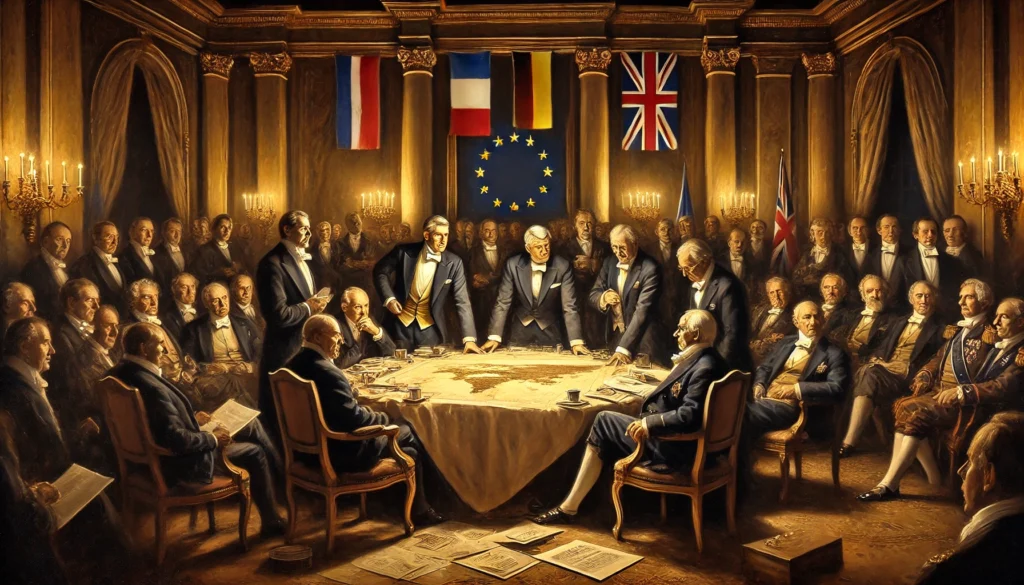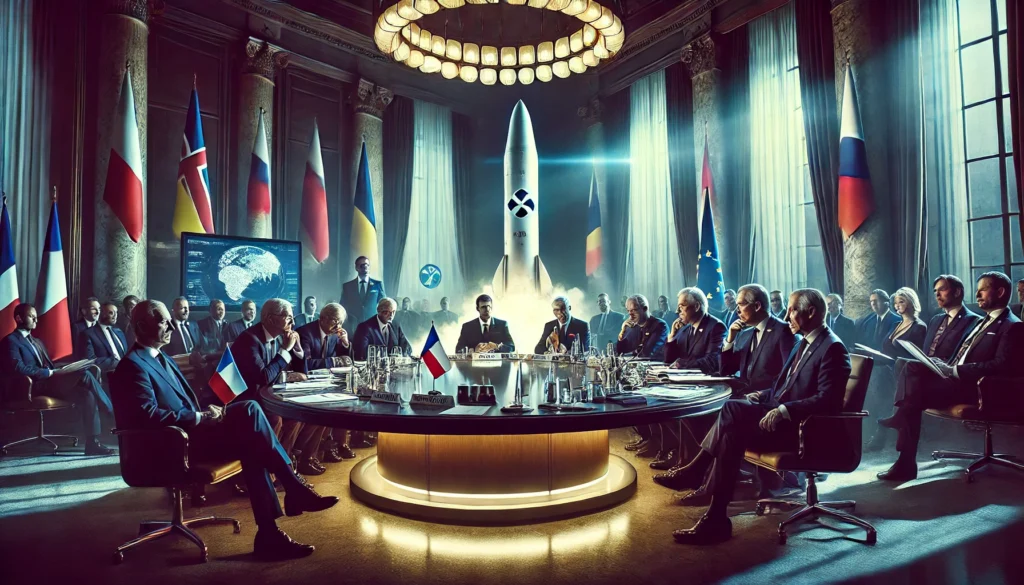Poland and France Explore Nuclear Cooperation Amid Uncertainty Over U.S. Security Guarantees
In a historic shift in European defense policy, Poland has signaled interest in nuclear cooperation with France, raising fundamental questions about Europe’s future security strategy.
 “We would be safer if we had our own nuclear arsenal,” said Polish Prime Minister Donald Tusk on March 7. While he stopped short of proposing an immediate Polish nuclear weapons program, his comments reflect growing anxiety over the United States’ shifting geopolitical priorities under Donald Trump’s leadership.
“We would be safer if we had our own nuclear arsenal,” said Polish Prime Minister Donald Tusk on March 7. While he stopped short of proposing an immediate Polish nuclear weapons program, his comments reflect growing anxiety over the United States’ shifting geopolitical priorities under Donald Trump’s leadership.
With Germany’s incoming Chancellor Friedrich Merz calling for European nuclear consultations and French President Emmanuel Macron announcing a “strategic debate” on deterrence, the conversation around Europe’s nuclear future is heating up like never before.
Europe’s Nuclear Dilemma: Credibility vs. Capability
For nearly 80 years, Europe has relied on the U.S. nuclear umbrella under NATO’s extended deterrence strategy. However, the fundamental question remains:
 Would the U.S. really risk nuclear war to protect European allies?
Would the U.S. really risk nuclear war to protect European allies?
 The U.K. Factor – Britain’s nuclear arsenal is tied to NATO but ultimately remains under London’s control. British nuclear deterrence implicitly covers allies such as Finland, Romania, and Turkey.
The U.K. Factor – Britain’s nuclear arsenal is tied to NATO but ultimately remains under London’s control. British nuclear deterrence implicitly covers allies such as Finland, Romania, and Turkey.
 The French Model – Unlike Britain, France has always maintained an independent nuclear doctrine, refusing to participate in NATO’s Nuclear Planning Group (NPG). France’s approach is designed to protect its own vital interests rather than guarantee Europe’s security.
The French Model – Unlike Britain, France has always maintained an independent nuclear doctrine, refusing to participate in NATO’s Nuclear Planning Group (NPG). France’s approach is designed to protect its own vital interests rather than guarantee Europe’s security.
 Germany and Poland’s Position – Both countries recognize the strategic uncertainty created by Trump’s America First doctrine and are now exploring alternative nuclear deterrence models to ensure European security.
Germany and Poland’s Position – Both countries recognize the strategic uncertainty created by Trump’s America First doctrine and are now exploring alternative nuclear deterrence models to ensure European security.
France’s Role: A Potential European Nuclear Shield?
Macron’s nuclear policy has always been ambiguous—he acknowledges that French nuclear weapons protect certain European partners, yet stops short of formalizing an extended deterrence framework.
 1995 France-Britain Agreement – This agreement implied that if one country’s “vital interests” were threatened, so were the other’s, hinting at an implicit European security umbrella.
1995 France-Britain Agreement – This agreement implied that if one country’s “vital interests” were threatened, so were the other’s, hinting at an implicit European security umbrella.
 2019 Franco-German Aachen Treaty – This reinforced France’s commitment to protecting European interests, but without offering explicit nuclear guarantees.
2019 Franco-German Aachen Treaty – This reinforced France’s commitment to protecting European interests, but without offering explicit nuclear guarantees.
 2022 Macron’s Nuclear Stance – When asked if France would respond to a Russian nuclear strike in Ukraine, he hesitated, stating that French vital interests were “clearly defined”—but Ukraine was not included in them.
2022 Macron’s Nuclear Stance – When asked if France would respond to a Russian nuclear strike in Ukraine, he hesitated, stating that French vital interests were “clearly defined”—but Ukraine was not included in them.
 Now, Eastern European allies, particularly Poland, want clarity.
Now, Eastern European allies, particularly Poland, want clarity.
 “I would like to know, in detail, what this means in terms of power and use,” Tusk told reporters, suggesting that Poland may seek some level of launch authority over French nuclear weapons.
“I would like to know, in detail, what this means in terms of power and use,” Tusk told reporters, suggesting that Poland may seek some level of launch authority over French nuclear weapons.
Could Europe Develop Its Own Nuclear Arsenal?
While a fully independent European nuclear arsenal remains unlikely due to legal, technical, and financial constraints, alternative options exist:
 1. Strengthened Franco-European Deterrence
1. Strengthened Franco-European Deterrence
France could:
 Join NATO’s Nuclear Planning Group as an observer (though not a full participant).
Join NATO’s Nuclear Planning Group as an observer (though not a full participant).
 Clarify its commitment to defending Europe using nuclear weapons under the EU’s Article 42.7 mutual defense clause.
Clarify its commitment to defending Europe using nuclear weapons under the EU’s Article 42.7 mutual defense clause.
 Increase cooperation in nuclear exercises—a move already tested in 2022 when an Italian tanker refueled French nuclear-capable jets.
Increase cooperation in nuclear exercises—a move already tested in 2022 when an Italian tanker refueled French nuclear-capable jets.
 2. NATO-Style Nuclear Sharing
2. NATO-Style Nuclear Sharing
Modeled after the U.S. nuclear-sharing agreement, where American B61 nuclear bombs are stationed in Europe, France could:
 Rotate unarmed nuclear-capable Rafale jets to Eastern European air bases, extending the range of a potential nuclear response.
Rotate unarmed nuclear-capable Rafale jets to Eastern European air bases, extending the range of a potential nuclear response.
 Store French air-launched nuclear missiles in Germany, creating a European deterrence infrastructure.
Store French air-launched nuclear missiles in Germany, creating a European deterrence infrastructure.
 Allow allied countries to participate in nuclear delivery missions, similar to how Belgium, Germany, Italy, and Turkey contribute to U.S. nuclear operations.
Allow allied countries to participate in nuclear delivery missions, similar to how Belgium, Germany, Italy, and Turkey contribute to U.S. nuclear operations.
 3. A European Nuclear Maritime Task Force
3. A European Nuclear Maritime Task Force
France and Britain could:
 Expand joint nuclear patrols in the Atlantic and Mediterranean.
Expand joint nuclear patrols in the Atlantic and Mediterranean.
 Station air-launched nuclear missiles on shared European platforms.
Station air-launched nuclear missiles on shared European platforms.
 Create a joint European nuclear deterrent naval force.
Create a joint European nuclear deterrent naval force.
The British Dilemma: Can the U.K. Maintain Its Nuclear Arsenal Without U.S. Support?
The biggest risk to European nuclear autonomy lies in the U.K.’s dependence on American nuclear technology.
 Key Issues:
Key Issues:
 The U.K.’s nuclear missiles are leased from the U.S.—if Washington withdraws support, Britain could lose operational capability.
The U.K.’s nuclear missiles are leased from the U.S.—if Washington withdraws support, Britain could lose operational capability.
 Warhead designs rely on U.S. components, making long-term independence challenging.
Warhead designs rely on U.S. components, making long-term independence challenging.
 If Trump disengages from NATO, Britain may have to seek alternative nuclear partnerships—potentially with France.
If Trump disengages from NATO, Britain may have to seek alternative nuclear partnerships—potentially with France.
 Possible Solution? The “New Entente”
Possible Solution? The “New Entente”
Some defense analysts propose a Franco-British nuclear pact, reviving ideas from the 1970s and 1980s, where:
 France could sell submarine-launched missiles to Britain.
France could sell submarine-launched missiles to Britain.
 The two nations could co-develop a nuclear-capable cruise missile.
The two nations could co-develop a nuclear-capable cruise missile.
 Joint European nuclear deterrence efforts could be explored.
Joint European nuclear deterrence efforts could be explored.
The Road Ahead: Will Europe Take Control of Its Own Nuclear Security?
 Macron’s strategic debate is just beginning.
Macron’s strategic debate is just beginning.
 Poland and Germany’s nuclear ambitions are growing.
Poland and Germany’s nuclear ambitions are growing.
 Britain faces an existential dilemma on nuclear independence.
Britain faces an existential dilemma on nuclear independence.
 “There are plenty of ideas, but we lack clear French political guidance,” says Héloïse Fayet of the IFRI think tank in Paris.
“There are plenty of ideas, but we lack clear French political guidance,” says Héloïse Fayet of the IFRI think tank in Paris.
Whether Europe can build a credible nuclear deterrent independent of America’s shifting policies remains an open question. But one thing is clear:
Trump has triggered the most profound nuclear debate in Europe since the Cold War.
 Stay updated on global defense and security affairs at GlobalWorldCitizen.com
Stay updated on global defense and security affairs at GlobalWorldCitizen.com 










































